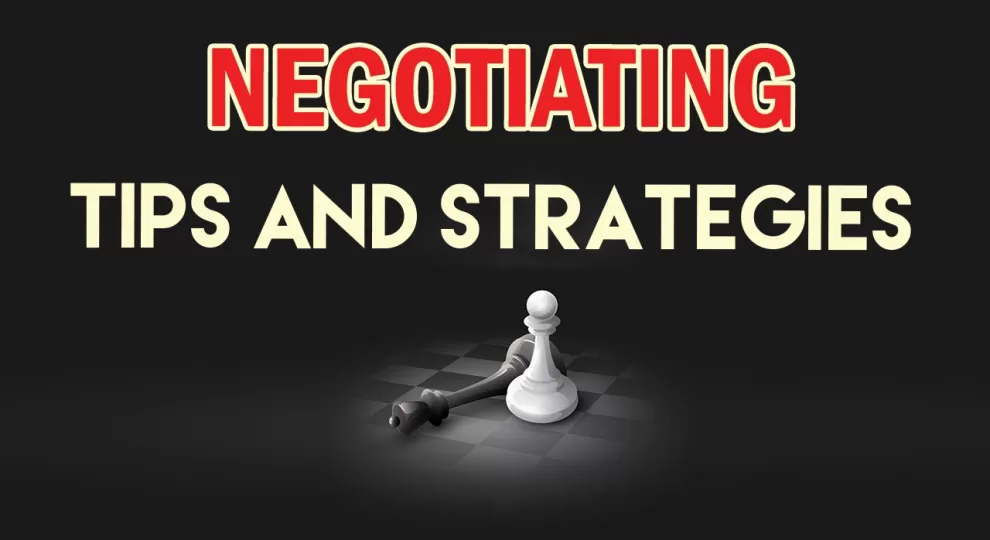
Negotiation – Tips and Strategies to help you sell it yourself
Selling a house involves several steps. Putting your house up for sale means you must first prepare it, determine an appropriate marketing strategy and conduct inspections. Negotiation comes into play once offers have started to trickle in.
Obviously, your goal is to get the highest price possible. But it’s not as straightforward as simply accepting the highest offer. Sometimes there are other things to consider, like the variables of each offer and deciding which fits your needs best.
We’re here to help!
Here’s our guide to negotiating like a pro – and don’t forget to check the video to see more tips and tricks.
A quick negotiation is a good negotiation.
Where possible, give the buyer a categorical answer as soon as you can. Even if you can’t give an answer right away, still respond promptly with the exact timeframe you’ll be able to give them an answer.
Taking excess time just increases the chances the buyer can find another property they like, or have someone undermine their decision to purchase.
Always negotiate in person.
Where possible, try to speak to people directly rather than emailing or texting. You should also be extremely contactable during this time. We don’t recommend trying to play “hard to get” unless you’re really sure about what you’re doing, and you’re willing to walk away with nothing.
Don’t get reeled in.
Buyer’s commonly ask fishing questions to determine your lowest price instead of making an actual offer. You can learn how to deflect these questions and put the onus back on the buyer.
This technique is actually quite simple to employ (practice with a friend to help you prepare).
- When the buyer pushes you for your absolute bottom line, simply deflect the question and re-purpose it back to them.
- For example, if they ask: “What’s the lowest price you’ll take?” You can respond with: “I’d much prefer if you just place your best offer in writing, and allow me to consider it. How does that sound?”
- If they still push you for a ballpark figure, you could say: “I understand you need a ballpark, that’s why I’ve set the price where it is. It’s a price I feel is fair but it doesn’t mean I won’t listen to offers. If you don’t agree with my assessment, then I’m happy for you to make your own assessment and I can quickly consider it.”
Property negotiations are serious business.
Be sure to retain clarity and a level of seriousness during any negotiations. Any time a buyer genuinely wants to make an offer, request they put the full details of their offer in writing.
This isn’t legally binding. It simply helps to make everything feel a little more real and promotes a sense of seriousness, urgency, and clarity. A written offer also gives you something to refer to during the next step should the buyer places many conditions on their offer.
Change the perspective.
It can also be helpful to change the negotiation’s focus and perspective. For example, you could agree to accept an offer on the proviso a deposit is put down, or contracts are signed within a certain timeframe. Money talks – a buyer willing to put down a deposit is a serious buyer.
In the buyer’s mind, this creates a reason to move to the next step, and for you to accept their particular offer. Conditions that aren’t related to price also relieve the pressure for you both if you’re getting stuck on price negotiations alone.
Split the difference.
If negotiation becomes stuck on all points, you could consider “splitting the difference” – it’s as simple as it sounds. You and the buyer simply agree to meet in the middle in terms of price, settlement date, inclusions, or whatever you’re stuck on.
A good negotiation is about trying to create a win-win scenario. It’s not about one side getting everything they want. A little bit of compromise goes a long way to ensure a successful negotiation where both parties walk away satisfied. This is where you need to focus on your bottom line and key priorities.
Keep yourself nice.
Finally, keep things professional. Your demeanour should be confident, polite, and positive. Never personally attack a buyer over their offer. If you feel affronted by something they’ve said, always respond calmly and politely – even if you need to take a moment to do so.
The last thing you want is for negotiations to fall apart because the buyer made an ill-considered remark on your choice of carpeting. Remember, this is one of the biggest purchases most people will ever make, so tensions can run high.
Follow these strategies and your next negotiation should run smoothly and easily. The best negotiations are when you stay aware of your options and keep your bottom line in mind, so you have a higher chance of achieving a price for your home you’ll feel happy with.
Remember, if you’re feeling stuck, you can always ask us for help! We’re here to make the process as simple and pain-free as possible. Get in touch today if you have any questions.